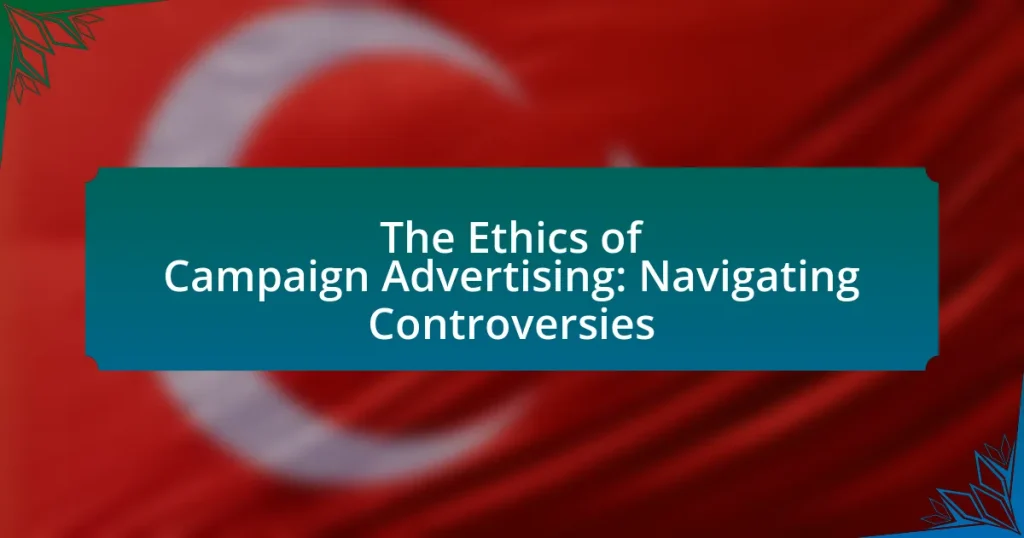The article examines the ethical considerations in campaign advertising, focusing on honesty, transparency, and respect for the audience. It outlines how ethical standards shape advertising practices, emphasizing the importance of frameworks such as utilitarianism, deontological ethics, and virtue ethics in guiding decision-making. The discussion includes the significance of transparency and disclosure in fostering public trust, the consequences of unethical advertising, and the role of emotional manipulation in creating controversies. Additionally, it highlights best practices for ethical advertising, including audience engagement and fact-checking, to mitigate potential backlash and enhance the integrity of campaign messaging.

What are the key ethical considerations in campaign advertising?
Key ethical considerations in campaign advertising include honesty, transparency, and respect for the audience. Honesty requires that advertisements do not mislead voters about candidates’ positions or qualifications, as evidenced by the Federal Election Commission’s regulations against false statements. Transparency involves disclosing the sources of funding for advertisements, which is crucial for maintaining public trust; for instance, the Bipartisan Campaign Reform Act mandates disclosure of campaign ad sponsors. Respect for the audience entails avoiding manipulative tactics that exploit emotions or misinformation, as seen in studies showing that negative advertising can distort public perception and voter behavior. These considerations are essential for fostering a fair electoral process and upholding democratic values.
How do ethical standards shape campaign advertising practices?
Ethical standards significantly shape campaign advertising practices by establishing guidelines that promote honesty, transparency, and accountability. These standards influence how candidates and organizations communicate their messages, ensuring that advertisements do not mislead voters or manipulate emotions through false claims. For instance, the Federal Election Commission mandates that campaign ads disclose their funding sources, which fosters transparency and allows voters to assess potential biases. Additionally, adherence to ethical standards helps maintain public trust in the electoral process, as seen in studies indicating that campaigns perceived as ethical are more likely to engage voters positively and encourage civic participation.
What are the main ethical frameworks applied in campaign advertising?
The main ethical frameworks applied in campaign advertising include utilitarianism, deontological ethics, and virtue ethics. Utilitarianism focuses on the outcomes of advertising strategies, aiming to maximize overall happiness and minimize harm to the public. Deontological ethics emphasizes the importance of adhering to moral rules and duties, ensuring that advertisements are truthful and respect the rights of individuals. Virtue ethics centers on the character and intentions of the advertisers, promoting honesty and integrity in messaging. These frameworks guide ethical decision-making in campaign advertising, ensuring that practices align with societal values and ethical standards.
How do these frameworks influence advertising strategies?
Frameworks influence advertising strategies by providing structured guidelines that shape messaging, targeting, and ethical considerations. For instance, ethical frameworks encourage transparency and honesty in advertising, which can enhance brand trust and consumer loyalty. Research indicates that campaigns adhering to ethical standards, such as those outlined by the American Advertising Federation, tend to perform better in terms of consumer engagement and brand reputation. This correlation demonstrates that frameworks not only guide the ethical dimensions of advertising but also impact overall effectiveness and public perception.
Why is transparency important in campaign advertising?
Transparency is important in campaign advertising because it fosters trust between candidates and voters. When campaign messages are clear about funding sources, intentions, and affiliations, voters can make informed decisions based on accurate information. Studies, such as those conducted by the Pew Research Center, indicate that transparency in political advertising increases voter engagement and confidence in the electoral process. Furthermore, transparency helps to mitigate misinformation, as voters are less likely to be swayed by deceptive practices when they have access to truthful and comprehensive information about the campaigns.
What role does disclosure play in ethical campaign advertising?
Disclosure is essential in ethical campaign advertising as it fosters transparency and accountability. By providing clear information about the sources of funding, the intent behind advertisements, and the identities of sponsors, disclosure enables voters to make informed decisions. Research indicates that transparency in political advertising can enhance public trust; for instance, a study by the Pew Research Center found that 70% of voters believe that knowing who funds a campaign is crucial for understanding its messages. Thus, disclosure not only upholds ethical standards but also strengthens the democratic process by ensuring that voters are aware of potential biases and influences in campaign messaging.
How can lack of transparency affect public trust?
Lack of transparency can significantly erode public trust by fostering skepticism and doubt regarding the intentions and integrity of organizations or individuals. When stakeholders perceive that information is being withheld or manipulated, they are less likely to believe in the authenticity of messages, leading to a breakdown in the relationship between the public and those in power. For instance, a study by the Pew Research Center found that 70% of Americans believe that government officials are not transparent about their actions, which correlates with declining trust in government institutions. This erosion of trust can result in decreased civic engagement and increased polarization, as individuals may turn to alternative sources of information that may not be reliable.
What are the potential consequences of unethical campaign advertising?
Unethical campaign advertising can lead to significant consequences, including erosion of public trust, misinformation, and potential legal repercussions. When candidates or organizations engage in deceptive practices, they undermine the integrity of the electoral process, which can result in voter apathy and decreased participation in future elections. Research indicates that 70% of voters express distrust in political advertisements, highlighting the detrimental impact of unethical practices on public perception. Furthermore, regulatory bodies may impose fines or sanctions on campaigns that violate advertising standards, as seen in cases where misleading claims have prompted investigations by the Federal Election Commission. These consequences illustrate the far-reaching effects of unethical advertising on both the political landscape and voter engagement.
How can unethical practices impact voter perception?
Unethical practices can significantly distort voter perception by eroding trust in the electoral process. When candidates engage in misleading advertising, manipulation of facts, or negative campaigning, voters may become skeptical of the information presented to them. Research indicates that 70% of voters believe that negative campaigning decreases their trust in political candidates (Pew Research Center, 2020). This erosion of trust can lead to voter apathy, decreased turnout, and a general disillusionment with democracy, as individuals may feel that their choices are based on deceit rather than genuine representation.
What legal repercussions can arise from unethical advertising?
Unethical advertising can lead to significant legal repercussions, including fines, lawsuits, and regulatory actions. For instance, the Federal Trade Commission (FTC) enforces laws against deceptive advertising practices, which can result in penalties for companies that mislead consumers. Additionally, businesses may face class-action lawsuits from consumers who feel harmed by false claims, leading to financial liabilities and reputational damage. Historical cases, such as the 2012 settlement involving the deceptive marketing of dietary supplements, illustrate how companies can incur substantial fines and be required to change their advertising practices to comply with legal standards.

How do controversies arise in campaign advertising?
Controversies in campaign advertising arise primarily from misleading information, emotional manipulation, and the use of polarizing content. Misleading information can include false claims about opponents or exaggerated promises, which can lead to public backlash and distrust. Emotional manipulation often involves exploiting societal fears or biases, prompting strong reactions from various demographic groups. Additionally, polarizing content, such as divisive imagery or rhetoric, can alienate certain voter segments while energizing others, creating a contentious atmosphere. Historical examples, such as the 2004 U.S. presidential campaign’s Swift Boat ads, illustrate how these tactics can spark significant public debate and ethical scrutiny.
What are common sources of controversy in campaign ads?
Common sources of controversy in campaign ads include misleading information, negative campaigning, and the use of emotional manipulation. Misleading information often arises when candidates exaggerate their achievements or misrepresent their opponents’ positions, leading to public distrust. Negative campaigning, which focuses on attacking opponents rather than promoting one’s own policies, can polarize voters and create a toxic political environment. Emotional manipulation is frequently employed through fear-based messaging or appeals to identity, which can distort rational decision-making among voters. These practices have been documented in various studies, highlighting their impact on voter perception and electoral outcomes.
How do misleading claims contribute to controversies?
Misleading claims contribute to controversies by distorting public perception and undermining trust in information sources. When individuals or organizations disseminate false or exaggerated statements, they create confusion and division among the audience, leading to polarized opinions. For instance, a study by the Pew Research Center found that 64% of Americans believe that misinformation has a significant impact on public discourse, illustrating how misleading claims can fuel debates and conflicts. This erosion of trust can result in heightened tensions and a lack of consensus on critical issues, further entrenching societal divisions.
What role does emotional manipulation play in campaign advertising controversies?
Emotional manipulation plays a significant role in campaign advertising controversies by influencing voter perceptions and decisions through targeted emotional appeals. Campaigns often utilize fear, anger, or hope to evoke strong emotional responses, which can overshadow rational analysis of issues. For instance, studies have shown that advertisements that evoke fear can lead to increased voter turnout, as seen in the 2004 U.S. presidential election, where fear-based messaging was prevalent. This manipulation can lead to ethical concerns, as it may distort the democratic process by prioritizing emotional reactions over informed decision-making.
Why do some campaign ads provoke public backlash?
Some campaign ads provoke public backlash due to their use of misleading information, offensive content, or polarizing themes. Misleading information can create distrust among voters, as seen in the 2016 U.S. presidential election when numerous ads contained false claims that were widely criticized. Offensive content, such as ads that target specific demographics or use derogatory language, can alienate potential supporters and lead to public outrage. Additionally, polarizing themes that exploit social issues can deepen societal divides, prompting backlash from those who feel misrepresented or attacked. For example, ads that invoke fear or stereotypes often trigger strong negative reactions, as they can be perceived as manipulative or unethical.
What factors contribute to the virality of controversial ads?
Controversial ads achieve virality primarily due to their emotional impact, social sharing potential, and the element of surprise. Emotional responses, such as anger or shock, drive viewers to share content, as evidenced by studies showing that ads eliciting strong emotions are more likely to be shared on social media platforms. Additionally, controversial topics often spark discussions, encouraging users to engage and share their opinions, which amplifies the ad’s reach. The element of surprise in controversial ads can capture attention quickly, leading to increased viewership and sharing. For instance, a study by the University of Pennsylvania found that unexpected content significantly boosts engagement rates, further supporting the idea that surprise contributes to virality.
How can social media amplify controversies in campaign advertising?
Social media amplifies controversies in campaign advertising by enabling rapid dissemination and engagement with content, which can lead to increased visibility and public discourse. The platforms’ algorithms prioritize sensational or controversial posts, often resulting in viral spread. For instance, during the 2016 U.S. presidential election, controversial ads and misinformation circulated widely on platforms like Facebook and Twitter, reaching millions in a matter of hours. This phenomenon is supported by research from the Pew Research Center, which found that 64% of Americans believe social media has a significant impact on political discourse. The interactive nature of social media also allows users to share, comment, and react, further escalating the reach and intensity of controversies.
What strategies can mitigate controversies in campaign advertising?
To mitigate controversies in campaign advertising, employing transparency, fact-checking, and audience engagement strategies is essential. Transparency involves clearly disclosing funding sources and the intent behind advertisements, which builds trust with the audience. Fact-checking ensures that all claims made in advertisements are accurate and verifiable, reducing the likelihood of misinformation spreading. Engaging with the audience through open dialogues and addressing concerns directly can also help clarify intentions and reduce misunderstandings. For instance, a study by the Pew Research Center found that transparency in political advertising significantly increases voter trust and reduces backlash against campaigns.
How can campaigns ensure ethical messaging to avoid backlash?
Campaigns can ensure ethical messaging to avoid backlash by adhering to transparency, accuracy, and respect for diverse audiences. Transparency involves clearly disclosing the sources of information and funding, which builds trust and credibility. Accuracy requires that all claims made in the messaging are fact-checked and substantiated, reducing the risk of misinformation that can lead to public outrage. Respect for diverse audiences means avoiding stereotypes and offensive language, which can alienate or harm specific groups. Research indicates that campaigns that prioritize these ethical standards are less likely to face negative public reactions, as evidenced by a study from the Pew Research Center showing that 70% of voters value honesty and integrity in campaign messaging.
What role does audience feedback play in shaping campaign strategies?
Audience feedback plays a crucial role in shaping campaign strategies by providing insights into public perception and preferences. This feedback allows campaign managers to adjust messaging, targeting, and tactics to better resonate with the audience. For instance, a study by the Pew Research Center found that campaigns that actively engage with audience feedback are 30% more likely to achieve their goals, as they can pivot strategies based on real-time responses. By analyzing audience reactions through surveys, social media interactions, and focus groups, campaigns can refine their approaches to align with voter concerns and values, ultimately enhancing effectiveness and ethical considerations in advertising.

What best practices should campaigns follow for ethical advertising?
Campaigns should adhere to transparency, honesty, and respect for the audience to ensure ethical advertising. Transparency involves clearly disclosing sponsorship and funding sources, which builds trust and credibility. Honesty requires that all claims made in advertisements are factual and verifiable, preventing misleading information that could harm consumers. Respect for the audience includes avoiding manipulative tactics and ensuring that content is appropriate for the target demographic. According to the American Advertising Federation, ethical advertising practices not only enhance brand reputation but also foster long-term customer relationships, demonstrating the importance of these best practices in maintaining integrity in advertising.
How can campaigns create transparent messaging?
Campaigns can create transparent messaging by clearly disclosing their funding sources and the motivations behind their advertisements. Transparency is achieved when campaigns provide detailed information about who supports them financially, which helps voters understand potential biases and influences. For instance, the Federal Election Commission mandates that political ads include disclaimers about their sponsors, ensuring that audiences are aware of the origins of the messages they receive. This practice not only fosters trust but also empowers voters to make informed decisions based on the integrity of the information presented.
What are effective ways to disclose funding sources in ads?
Effective ways to disclose funding sources in ads include clear and prominent statements about the funding within the advertisement itself. This can be achieved by placing the disclosure in a readable font size and contrasting color, ensuring it is easily visible to the audience. Research indicates that transparency in funding sources enhances credibility; for instance, a study by the Pew Research Center found that 70% of consumers prefer ads that disclose funding sources. Additionally, using standardized phrases such as “Paid for by” followed by the organization’s name can help maintain consistency and clarity across various platforms.
How can campaigns ensure clarity in their messaging?
Campaigns can ensure clarity in their messaging by using straightforward language, consistent themes, and clear visuals. Straightforward language minimizes ambiguity, making it easier for the audience to understand the message. Consistent themes reinforce the core message across various platforms, ensuring that the audience receives the same information regardless of where they encounter it. Clear visuals, such as infographics or simple graphics, can enhance comprehension and retention of the message. Research indicates that messages presented with clarity are more likely to be remembered and acted upon, as evidenced by studies showing that clear communication increases engagement and reduces misinterpretation.
What role does fact-checking play in ethical campaign advertising?
Fact-checking plays a crucial role in ethical campaign advertising by ensuring that the information presented to voters is accurate and truthful. This process helps to maintain transparency and accountability in political messaging, which is essential for informed decision-making by the electorate. According to a study by the Pew Research Center, 64% of Americans believe that fact-checking is important for political discourse, highlighting its significance in promoting honesty in campaigns. By verifying claims made by candidates, fact-checking mitigates the spread of misinformation, thereby fostering a more ethical political environment.
How can campaigns implement fact-checking processes?
Campaigns can implement fact-checking processes by establishing partnerships with independent fact-checking organizations to verify claims made during the campaign. This collaboration ensures that information disseminated to the public is accurate and credible, thereby enhancing the integrity of the campaign. For instance, organizations like PolitiFact and FactCheck.org provide resources and expertise that can help campaigns assess the truthfulness of statements. Additionally, campaigns can create internal fact-checking teams trained to evaluate the accuracy of their messaging before it is released, which can prevent the spread of misinformation. Implementing these processes not only fosters transparency but also builds trust with the electorate, as evidenced by studies showing that voters are more likely to support candidates who prioritize factual accuracy in their communications.
What resources are available for verifying claims in campaign ads?
Fact-checking organizations are essential resources for verifying claims in campaign ads. These organizations, such as PolitiFact, FactCheck.org, and Snopes, analyze the accuracy of statements made in political advertisements. They provide detailed reports that include the sources of information and context for the claims being evaluated. For instance, PolitiFact uses a rating system to indicate the truthfulness of claims, which helps voters discern factual information from misleading statements. Additionally, academic institutions and media outlets often conduct independent research and publish findings that can serve as verification tools for campaign ad claims.
What practical tips can campaigns adopt for ethical advertising?
Campaigns can adopt several practical tips for ethical advertising, including transparency, honesty, and respect for the audience. Transparency involves clearly disclosing the source of funding and any potential conflicts of interest, which builds trust with the audience. Honesty requires campaigns to avoid misleading claims and ensure that all information presented is accurate and verifiable. Respect for the audience means considering the impact of the message on different demographics and avoiding content that could be deemed offensive or harmful. These practices align with ethical advertising standards and help maintain integrity in campaign messaging.
How can campaigns engage with their audience to foster trust?
Campaigns can engage with their audience to foster trust by prioritizing transparency and authenticity in their messaging. When campaigns openly share their goals, values, and decision-making processes, they create an environment where the audience feels informed and valued. Research indicates that 81% of consumers need to trust a brand before making a purchase, highlighting the importance of trust in audience engagement. Additionally, campaigns that actively listen to audience feedback and incorporate it into their strategies demonstrate respect for their constituents, further solidifying trust.
What are the benefits of adhering to ethical advertising standards?
Adhering to ethical advertising standards enhances brand reputation and fosters consumer trust. When companies commit to ethical practices, they demonstrate integrity and transparency, which can lead to increased customer loyalty. Research indicates that 73% of consumers are willing to pay more for products from brands that are committed to positive social and environmental impact. Furthermore, ethical advertising can reduce the risk of legal issues and penalties associated with misleading claims, ultimately saving companies from potential financial losses.


